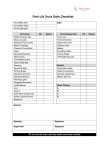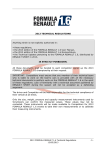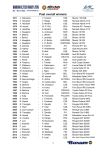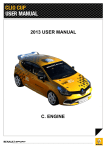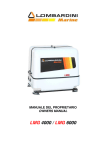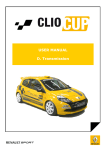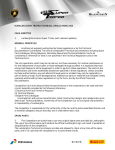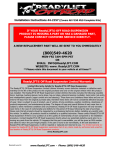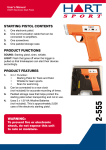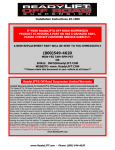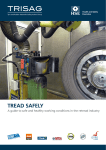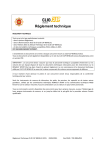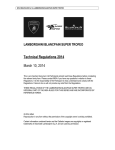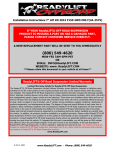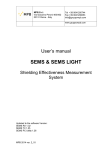Download 2013 TECHNICAL REGULATIONS
Transcript
2013 TECHNICAL REGULATIONS 2013 TECHNICAL REGULATIONS Everything which is not explicitly authorised: • • • • in these Regulations, in the 2013 edition of the Nomenclature for the FORMULA RENAULT 2.0, in the 2013 edition of the FORMULA RENAULT 2.0 Technical Manual, and in any official FORMULA RENAULT 2.0 ALPS Technical Bulletin, that may be published during the 2013 FORMULA RENAULT 2.0 ALPS, IS STRICTLY FORBIDDEN All of these documents will be issued to each Competitor registered for the 2013 FORMULA RENAULT 2.0 ALPS. All these documents are also available from the websites www.renaultsportitalia.it http://extranet-competition.renault-sport.com and Access to these websites is individual and personalised. Each competitor, driver, engineer or mechanic who can prove a technical interest for the FORMULA RENAULT 2.0 ALPS can request Fast Lane Promotion (hereafter the company will be referred to as “FLP”) to have access to the websites. IMPORTANT: All competitors must ensure that every person of his technical staff that has to work on the car has access to all the necessary technical documentation needed to operate the FORMULA RENAULT 2.0 conformity with the present regulations. Being not aware of a technical document released by RENAULT SPORT and FLP during the season will not be retained as a relevant point in case of protest. At every moment of an event the driver and the competitor will be held responsible of the conformity of the vehicle. Only the official measuring tools of length, mass, pressure or capacity used by the technical scrutineers will be retained as valid for the measured values. No contest on these values will be possible. During the events of the Formula Renault 2.0 Alps all theses tools will be available for the competitors to make their own measures or to calibrate their own tools. Formula Renault 2.0 Alps 2013 Technical Regulations 20/12/2012 1 2013 TECHNICAL REGULATIONS CONTENTS ARTICLE 1 – DEFINITIONS 1.1 - FORMULA RENAULT 2.0 SINGLE-SEATER 1.2 - BODYWORK 1.3 - WHEEL AND TYRE 1.4 - EVENT 1.5 - MINIMUM WEIGHT 1.6 - RACING WEIGHT 1.7 - COCKPIT 1.8 - SURVIVAL CELL 1.9 - TELEMETRY 1.10 - DATA ACQUISITION 1.11 - COCKPIT PROTECTION 1.12 – ON BOARD CAMERA ARTICLE 2 – REGULATIONS 2.1 - ROLE OF THE ASN/CSAI, RENAULT SPORT AND FLP 2.2 - PUBLICATION DATE FOR AMENDMENTS 2.3 - PERMANENT COMPLIANCE WITH THE REGULATIONS 2.4 - SEALS 2.5 - MEASUREMENTS 2.6 - TECHNICAL PASSPORT 2.7 - PRINCIPLES OF THE TECHNICAL REGULATIONS 2.8 - REPAIRS ARTICLE 3 – BODYWORK AND DIMENSIONS 3.1 - AUTHORIZED MODIFICATIONS 3.2 – SURVIVAL CELL 3.3 - BODYWORK AND DIMENSIONS 3.4 - IDENTIFICATION OF THE BODYWORK 3.5 - BODYWORK FACING THE GROUND 3.6 - AERODYNAMIC INFLUENCE ARTICLE 4 – WEIGHT 4.1 - MINIMUM WEIGHT 4.2 - RACING WEIGHT 4.3 - BALLAST 4.4 - ADDITIONS DURING THE RACE AND QUALIFYING 4.5 - WEIGHT CHECKS Formula Renault 2.0 Alps 2013 Technical Regulations 20/12/2012 2 ARTICLE 5 – ENGINE 5.1 - AUTHORISED ENGINE 5.2 - MAINTENANCE OF THE RENAULT SPORT F4R 832 ENGINE 5.3 - EXHAUST SYSTEM 5.4 - ENGINE REMOVAL AND ALLOCATION ARTICLE 6 – FUEL PIPES AND TANKS 6.1 - FUEL TANK 6.2 - FITTINGS AND PIPES 6.3 - FUEL SAMPLING LOCATION ARTICLE 7 – LUBRICATION SYSTEM 7.1 - POSITION OF THE ENGINE OIL TANK 7.2 - CATCH TANK 7.3 - OIL REFILLING 7.4 - LUBRICANT PIPES 7.5 - ENGINE LUBRICANT ARTICLE 8 – ENGINE START 8.1 – IGNITION SYSTEM 8.2 - STARTING THE ENGINE 8.3 - BATTERY ARTICLE 9 – TRANSMISSION 9.1 - GEARBOX TYPE 9.2 - REVERSE GEAR 9.3 - GEARBOX REPAIR 9.4 – EMERGENCY CLUTCH ACTIVATION ARTICLE 10 – SUSPENSION AND STEERING SYSTEMS 10.1 - CHROME-PLATING OF SUSPENSION COMPONENTS 10.2 - SUSPENSION ARM 10.3 - STEERING 10.4 – BUMP STOP ARTICLE 11 – BRAKES 11.1 - AIR DUCT 11.2 - BRAKE FLUID 11.3 - BRAKE PADS 11.4 - LUBRICANT SAMPLING Formula Renault 2.0 Alps 2013 Technical Regulations 20/12/2012 3 ARTICLE 12 – WHEELS AND TYRES 12.1 - DIMENSIONS 12.2 - TYRES ARTICLE 13 – COCKPIT 13.1 - AUTHORIZED MODIFICATIONS 13.2 - STEERING WHEEL 13.3 - DRIVER POSITION ARTICLE 14 – SAFETY 14.1 - FIRE EXTINGUISHER 14.2 - MASTER SWITCH 14.3 - REAR VIEW MIRRORS 14.4 - SAFETY BELTS 14.5 - REAR RED LIGHT 14.6 - HANS® SYSTEM 14.7 - HELMETS 14.8 - WHEEL RETAINERS 14.9 - FITTING AND REMOVAL OF THE EXTRACTABLE SEAT ARTICLE 15 – FUEL 15.1 - FUEL 15.2 - ONBOARD FUEL 15.3 - OXIDANT ARTICLE 16 – ELECTRICAL SYSTEMS 16.1 - ELECTRONIC ENGINE CONTROL UNIT 16.2 - DATA ACQUISITION SYSTEM 16.3 - TELEMETRY 16.4 - DASHBOARD 16.5 - RADIO SYSTEMS ARTICLE 17 - TIMING TRANSPONDER 17.1 - PRESENCE OF A TIMING TRANSPONDER ARTICLE 18 - BINDING TEXT Formula Renault 2.0 Alps 2013 Technical Regulations 20/12/2012 4 ARTICLE 1 – DEFINITIONS 1.1 - FORMULA RENAULT 2.0 single-seater Car made to run exclusively during speed competitions on circuit or on closed roads. Only FORMULA RENAULT 2.0 single-seaters commercialised by RENAULT SPORT and compliant with these Technical Regulations and the 2013 Nomenclature will be allowed to take part in the 2013 FORMULA RENAULT 2.0 ALPS. 1.2 - Bodywork All entirely-sprung parts of the FORMULA RENAULT 2.0 single-seater in contact with the external air system, except for the roll-over protection hoop and those parts incontestably associated with the mechanical functioning of the engine, the transmission and the running gear. Radiators are considered as part of the bodywork. 1.3 - Wheel and tyre New tyre: Tyre that has never been used, supplied by the MICHELIN representative on the designated event (or collective test). Registered Tyre: Tyre that has been registered during a previous event, a collective test session or an official practice session. It may have been used or not. 1.4 - Event An event will be made up of the qualifying sessions and race(s). An event starts with the beginning of the preliminary scrutineering and ends with the opening of the "parc fermé" which follows the last race. 1.5 – Minimum weight The weight of the FORMULA RENAULT 2.0 single-seater at any moment of an event, without fuel or driver. 1.6 – Racing weight The weight of the FORMULA RENAULT 2.0 single-seater in running order, with the driver and his/her race equipment on board, with the remaining fuel in the tank. Article 1.5 still applies. 1.7 – Cockpit Volume in which the driver lies. Formula Renault 2.0 Alps 2013 Technical Regulations 20/12/2012 5 1.8 – Survival cell Closed structure containing the cockpit and the fuel tank. 1.9 - Telemetry Data transmission between a FORMULA RENAULT 2.0 single-seater in movement and an independent unit. 1.10 – DATA Acquisition Embedded system which records data from the vehicle. This system can be physically connected to a computer to download and analyse the recorded data. 1.11 - Cockpit protection Non-structural components situated in the cockpit whose only purpose is to increase driver comfort and safety. Any equipment of this type must be fire resistant and be able to be removed quickly, without tools. It must also be FIA-homologated. 1.12 – On board Camera It is allowed to use an on board camera during free practices, qualify sessions and races, in compliance with the specific provisions of the 2013 Formula Renault Alps Sporting Regulations – Art. 6.5. ARTICLE 2 – REGULATIONS A vehicle cannot take part in an event before being previously approved by the technical scrutineers. At any time of the event, the ASN, RENAULT SPORT and FLP scrutineers can: A) Check the conformity of a car, B) Require a partial or total disassembly of the car by the competitor to make sure that the conditions of acceptation or conformity are completely respected, C) Ask a competitor to supply any sample or any part or element which they could consider necessary. At the end of every qualifying session or at the arrival of every race, cars are placed under the regime of “parc fermé” and must be available for the technical scrutineering. A person in charge from the team is required near the “parc fermé” entrance. Any intervention under the regime of “parc fermé” (including control of tyre pressure and data acquisition download by a member of the team), must be subjected to the agreement and under control of the ASN, RENAULT SPORT and FLP scrutineers. Formula Renault 2.0 Alps 2013 Technical Regulations 20/12/2012 6 The controls and the technical checks will be made by the scrutineers duly appointed who will be the only one authorized to give instructions to the competitors. The Promoter of the FORMULA RENAULT 2.0 ALPS will publish the conclusions of the scrutineers concerning the technical checks of conformity of cars after every event. These results will not include any particular figure except when a car will be considered not in conformity with the Technical Regulation. 2.1 - Role of the ASN/CSAI, RENAULT SPORT and FLP Technical regulations applying to FORMULA RENAULT 2.0 ALPS single-seaters are issued by RENAULT SPORT and FLP in agreement with the ASN/CSAI. 2.2 - Publication date for amendments Each year, Renault Sport and FLP, in agreement with the ASN/CSAI, will publish any changes to these regulations. Changes made for safety reasons can come into effect without prior notice. 2.3 - Permanent compliance with the regulations FORMULA RENAULT 2.0 ALPS Single-seaters have to fully comply with the present regulations during all the course of an event. The competitors have to make sure that their car corresponds to the conditions of conformity and safety during all the duration of the event. The presentation of a car in the preliminary technical checks is considered as an implicit declaration of conformity. NB: The preliminary scrutineering is mainly centred on the eligibility of the cars for their participation in the event from the safety point of view. Any possible remark made by the scrutineers on the technical and sporting rules is given as information, and will have to lead to an alignment with the regulations to be able to participate in the qualifying and the races. 2.4 - Seals The engine must be sealed at all times (see Art. 5). Supplementary components may be sealed at any moment of an event. These seals must remain intact until the ASN, RENAULT SPORT and FLP Scrutineers authorize their removal. The state of the seals is the responsibility of the competitor. Any absence or deterioration will automatically result in a penalty that can extend to exclusion from the 2013 FORMULA RENAULT 2.0 ALPS. Any missing or deteriorated seal will be considered as a technical non conformity. The presence of seals only presumes compliance. Formula Renault 2.0 Alps 2013 Technical Regulations 20/12/2012 7 As part of Scrutineering, the sealed parts may be completely removed and if any non-compliance is observed, the presence of seals will not be accepted as an argument for defence. 2.5 - Measurements All size measurements (geometric) must be taken when the single-seater is stationary on a flat, horizontal and hard surface. All height measurements will be made when the single-seater is in normal race condition and the driver is seated in the single-seater. 2.6 - Technical passport (compulsory) ASN, RENAULT SPORT and FLP Scrutineers in charge of the 2013 FORMULA RENAULT 2.0 ALPS will fill out a technical passport during preliminary Scrutineering at the time of the single-seater’s first participation in the championship. Remarks added to this passport must be signed by a representative or the Competitor at each event. This passport will remain at the disposal of the Scrutineers. It’s also mandatory – ONLY for the ITALIAN COMPETITORS – the CSAI Technical Passport. 2.7 - Principles of the Technical Regulations The parts that make up the FORMULA RENAULT 2.0 cars are laid out in a "Nomenclature" document, issued to each competitor, and are divided into three categories. CATEGORY “A” CATEGORY “B” CATEGORY “C” No modifications are authorised. The parts in this category must remain in their original positions and fulfil the function/s for which they were originally intended. These parts must be genuine RENAULT SPORT or RENAULT parts. Parts of the category “A” being the subject of specific prescriptions. Only the modifications or prescriptions indicated in the regulations or in the 2013 edition of FORMULA RENAULT 2.0 Nomenclature are authorised. The parts classed in this category are considered to be unrestricted, on the express condition that the function for which it was originally designed is not deviated from, that it does not fulfil any additional function and that it is located in the same place as the original part. Their presence is mandatory. Adapted parts are permitted but must be submitted for approval to the RENAULT SPORT and FLP Scrutineers. The set of items or subassemblies that make up a part or assembly are deemed to belong to the same category as the part or assembly in question. Formula Renault 2.0 Alps 2013 Technical Regulations 20/12/2012 8 Scrutineering may consist of comparing the part to be checked against a similar new genuine FORMULA RENAULT 2.0 part. All parts not shown in the technical regulations are systematically classed in category "A" unless specified otherwise above. The pictures published in this document only aim at making the Nomenclature easier to understand. These pictures cannot be used for any comparison with original vehicle parts. Some parts from the A and B category present a special mark (hologram, engraving). The presence of this mark guarantees the origin of the part and their use is mandatory. The absence of a mark is a technical non conformity. An additional personalized mark, engraving or painting, may be placed to the parts from the A and B category. NB: Any addition of parts or set of parts, with no mention on the Nomenclature must be previously subjected to the approval of RENAULT SPORT. Nuts, screws, bolts, and uniballs Nuts, screws, bolts and uniballs are in the category “C” unless mentioned in the Nomenclature. However, the following must be respected: - the original diameters, - the original screw thread, - the material should be steel of equal or superior quality as that of the original part. The use of other materials (e.g., titanium) is forbidden. Any type of screw (stud, bolt or standard screws) is allowed, unless mentioned in the Nomenclature. To assure the tightness of the screws, the use of locking wire is permitted. All the screws that have the function of category "A" unless other mention in the Nomenclature. setting-up an element are in Washers Washers are in the category “C” unless mentioned in the Nomenclature and they can be removed. It is allowed to add washer only to improve mechanical assemblies. The use of washer for setting purpose is forbidden, unless specifically mentioned in the Nomenclature. Electrical loom All the electrical looms belong to category “B” and must be genuine. The loom may be protected by non-retractable sheathes. Formula Renault 2.0 Alps 2013 Technical Regulations 20/12/2012 9 Protection It is allowed to add protection of any kind over the mechanical elements of the car unless specifically mentioned in the Nomenclature. These protections must have the sole function of protecting the elements. For the driver wellness, it is allowed to add protections in the cockpit, these protections must be able to be removed fast and without tool. Supports It is allowed to add any type of support to enhance the maintenance and hygiene of piping, wiring, hoses of the car unless specifically mentioned in the Nomenclature. It is not allowed any change of parts to allow the addition of these supports. These supports must have the only function to keep the elements which they are used. Bodywork Only in order to manage correct assembly and adjustment of the bodywork part, it is allowed to slightly modify the bodywork parts and their respective supports. These modifications are submitted to the approved by ASN, RENAULT SPORT and FLP technical scrutineers. 2.8 - Repairs Any spare part used must respect the same criteria as outlined above, relative to the category that the part comes under. Parts classed in category “A” or “B” must be genuine RENAULT SPORT parts and appear in the 2013 edition of the FORMULA RENAULT 2.0 spare parts Catalogue. The driver and his competitor will be held responsible for the permanent compliance of their single-seater and any spare parts used on it; they must therefore assure themselves of their compliance before use. Any work on the single-seater must be carried out in accordance with methods defined by the various technical documents issued by RENAULT SPORT and with these Regulations, in order to keep the original single-seater configuration. Any genuine spare part which would not fit in place of the part it replaces without modification must not be used and must be exchanged from the FLP spare parts department, after having informed the ASN, RENAULT SPORT and FLP scrutineers about it. During an event, any car which, after having been approved by the scrutineers, would have been repaired or modified in a way that it can affect its safety or questions its conformity, or which would have taken part in an accident with similar consequences, must be again presented to the scrutineers by the competitor for a new approval. Formula Renault 2.0 Alps 2013 Technical Regulations 20/12/2012 10 ARTICLE 3 – BODYWORK AND DIMENSIONS 3.1 - Authorized modifications 3.1.1 Elements making up the bodywork, except for the crash boxes, may be repaired provided their shape is unchanged. Some elements have a minimum authorized weight mentioned in the annex Nomenclature. 3.1.2 The crash box can be repaired according to the procedure which can be found in the 2013 User Manual. 3.1.3 Adhesive tape may be put on the bodywork but only on fastening elements or other vulnerable leading or trailing edges. In all circumstances, the only purpose of adhesive tape must be to protect the element onto which it has been applied. It must not in any circumstance join various bodywork elements. 3.1.4 The bodywork can be painted or decorated with adhesive film. Only the modifications or prescriptions described in the 2013 edition of the Nomenclature and in the 2013 edition of the FORMULA RENAULT 2.0 Repair Manual are authorised. 3.2 – Survival cell 3.2.1 3.2.2 3.2.3 Any structural repair of the survival cell or the front crash box must be made by the chassis manufacturer or a repairer designated by RENAULT SPORT. Any structural repair of the survival cell or the front crash box must be declared by the competitors to the ASN, RENAULT SPORT and FLP Scrutineers with a written statement. The repair will be written on the technical passport of the vehicle and controlled by a ASN, RENAULT SPORT and FLP scrutineer. The single-seater can not take part in any other event if the comments in the technical passport do not allow it. 3.3 – Bodywork and dimensions Bodywork parts must keep: - Their original dimensions - Their original mountings - Their original locations. 3.4 - Identification of the bodywork The presence of bodywork component identification holograms is mandatory at all times. The driver and his Competitor are responsible for the state of the identification marks. They must be visible. Formula Renault 2.0 Alps 2013 Technical Regulations 20/12/2012 11 3.5 – Bodywork facing the ground 3.5.1 Reference plane: lower level outside of the single-seater’s bodyshell. Step plane: All sprung parts of the FORMULA RENAULT 2.0 single-seater which are visible from underneath and that are not part of the reference plane. A vertical tolerance of ± 5 mm is allowed between the surfaces situated on the step plane and the reference plane. 3.5.2 The wooden floor might be in contact with the ground. Only the tickness of the intermediate wood will be checked, around the 4 holes situated close to the longitudinal axle of the wood (refer to the FORMULA RENAULT 2.0 2013 Nomenclature, page 42.00). 3.6 – Aerodynamic influence The use of genuine wing profile is mandatory. Any specific part of the car the might have an influence on its aerodynamic performance: • must be rigidly fitted to the sprung part of the vehicle (no degrees of freedom); • must have no relative movement to the sprung part of the vehicle. ARTICLE 4 – WEIGHT 4.1 - Minimum weight The minimum weight of the single-seater is 508 kg (five hundred and eight kilograms). This weight is set for FORMULA RENAULT 2.0 single-seater following the article 1.5. 4.2 - Racing weight The minimum weight of the FORMULA RENAULT 2.0 single-seater, driver and his/her full equipment, must be no less than 583 kg (five hundred and eighty-three kilograms). This weight applies to FORMULA RENAULT 2.0 single-seater that have just taken part in a qualifying session or a race. 4.3 - Ballast Ballast can be used as long as it is fixed in such a way that tools are necessary to remove it. Its location on the single-seater is indicated in the FORMULA RENAULT 2.0 User Manual (2013 edition). It must be possible for seals to be applied to the ballast, should this be deemed necessary by the ASN, RENAULT SPORT and FLP Scrutineers. Formula Renault 2.0 Alps 2013 Technical Regulations 20/12/2012 12 If the FORMULA RENAULT 2.0 single-seater carries ballast in order to meet the weight required by the regulations, a MANDATORY declaration must be made by the Competitor about this ballast to the Scrutineers in charge of the 2013 FORMULA RENAULT 2.0 ALPS. 4.4 - Additions during the race and qualifying Without specific authorisation from the Scrutineer, the addition, during qualifying and the race, of any liquid or other material whatsoever, is forbidden until the end of the Parc Ferme period. 4.5 - Weight checks Weight checks can be performed at any time during an event, with the driver on board and the remaining liquid in the tanks (on the understanding that it is forbidden to add any oil, fuel, other liquids or extinguishing fluid before weighing). ARTICLE 5 – ENGINE 5.1 – Authorised engine The engine RENAULT SPORT F4R 832 is the only engine authorised. Only one engine will be allowed per FORMULA RENAULT 2.0 ALPS single-seater during the same meeting. The replacement of the engine will only be allowed in the following situations: - Engine dysfunction noticed by a RENAULT SPORT representative - Engine damaged In case of replacement of the monocoque, only the engine previously registered for the replaced monocoque might be used. Any engine change will have to be declared by the competitor to the RENAULT SPORT technical scrutineer and FLP who will be the only person able to give a written authorisation. Any engine change without prior written authorisation from the Technical Scrutineers will be considered as a non conformity. Any engine used in a single-seater Formula Renault 2.0 taking part in the 2013 FORMULA RENAULT 2.0 ALPS must have been subjected to a dyno test for a performance control and the installation of the 2013 FORMULA RENAULT 2.0 seals. This dyno test will be performed by a RENAULT SPORT designated engine tuner. Only engines with 2012 and 2013 seals will be allowed to be used in the 2013 FORMULA RENAULT 2.0 ALPS. Any transgression to this rule will be considered as a non conformity. Any engine not sealed, whose origin is unknown or different to that stated above, or where one or more seals are missing, will not under any circumstance be allowed to be used in the 2013 FORMULA RENAULT 2.0 ALPS and will be considered to be technically non-compliant. Formula Renault 2.0 Alps 2013 Technical Regulations 20/12/2012 13 The state of seals and their presence are of the responsibility of the driver and his competitor. Any engine without seals will be considered technically non compliant. 5.2 - Maintenance of the RENAULT SPORT F4R 832 engine The F4R 832 FORMULA RENAULT 2.0 engine is sealed when delivered. All repairs or servicing of the engine must be performed by RENAULT SPORT designated engine tuner. 5.3 - Exhaust system Use of the genuine FORMULA RENAULT 2.0 exhaust system is mandatory. 5.4 - Engine removal and allocation Any driver that has obtained three wins, be they consecutive or not, will have to change engine for the two following meetings. The driver will have the possibility to use a RENAULT SPORT engine or any other engine compliant to the technical regulations. In case of use of the RENAULT SPORT engine: • the lease will be charged 1000 (one thousand) Euros per meeting or per day of collective test. • The engine will be selected among the spares engines by a drawing of lot by ASN, RENAULT SPORT and FLP Technical scrutineers. In certain cases, Renault Sport e FLP reserves the right to extend the allocation of engines according to one of the following criteria: - Championship standings, - Race results at the previous meetings. This allocation will be done either at the end of an event or at the beginning of the next event. In the event of a breakdown to the engine allocated by RENAULT SPORT, an inspection will be carried out. If the failure is directly attributable to the Competitor, repair costs will be charged to the Competitor; if the failure is attributable to RENAULT SPORT or to one of its partners, the engine will be replaced. ARTICLE 6 – FUEL PIPES AND TANKS 6.1 - Fuel tank The use of the genuine FORMULA RENAULT 2.0 fuel tank is mandatory. Formula Renault 2.0 Alps 2013 Technical Regulations 20/12/2012 14 Reminder of FIA regulations: Rubber bladders must bear a code showing the name of the manufacturer, the specifications under which the tank was made and the date of manufacture. No rubber bladder must be used more than five years after the manufacture date, unless it has been re-certified by the manufacturer for a maximum extension period of two years. 6.2 - Fittings and pipes The use of genuine FORMULA RENAULT 2.0 fittings and pipes is mandatory. 6.3 – Fuel sampling location All the single-seaters are fitted with auto-obstructing connectors that can be used by the technical scrutineers to take a fuel sample from the fuel tank. ARTICLE 7 – LUBRICATION SYSTEM The use of the genuine FORMULA RENAULT 2.0 lubrication system and peripheral equipment is mandatory. The oil filter must be a genuine RENAULT part. Only the modifications or prescriptions described in the 2013 edition of the Nomenclature and in the 2013 edition of the FORMULA RENAULT 2.0 User Manual are authorised. 7.1 - Position of the engine oil tank The use of the genuine FORMULA RENAULT 2.0 engine oil tank, situated in the clutch housing, is mandatory. 7.2 - Catch tank The lubrication system includes an air vent. This must discharge into the catch tank situated in the clutch housing. 7.3 - Oil refilling No additional oil may be added during qualifying and races. 7.4 - Lubricant pipes The use of genuine FORMULA RENAULT 2.0 fittings and pipes is mandatory. Formula Renault 2.0 Alps 2013 Technical Regulations 20/12/2012 15 7.5 - Engine lubricant The use of the following lubricant ELF EXCELLIUM NF 5W40 is mandatory. Lubricant sampling The Competitor must take all necessary precautions for it to be always possible to take a sample of lubricant from the single-seater’s engine oil tank, for analysis, throughout the event. Three samples will be taken in three new containers: - Sample No. 1: 1 container for the analysis laboratory Sample No. 2: 1 container for the Competitor Sample No. 3: 1 container for second expert opinion, kept by the 2013 FORMULA RENAULT 2.0 ALPS organizers. Containers will be identified and sealed by the Scrutineers in the presence of the Competitor, or his/her representative. The origin, transportation or storage of samples 1 and 3 shall not be contested. Testing of the lubricant sample will be performed by a specialist analysis laboratory. ARTICLE 8 – ENGINE START 8.1 – Ignition system The use of the genuine FORMULA RENAULT 2.0 ignition system is mandatory. It must be activated by the driver from the cockpit with the safety belts on. 8.2 - Starting the engine The engine may be started either on the Start Grid or in the Pit Lane using an external battery, connected to the single-seater via a socket intended for this purpose. 8.3 - Battery The use of the genuine battery listed mentioned in the 2013 FORMULA RENAULT 2.0 Nomenclature is mandatory. The position of the battery must be original. It is mandatory to isolate the positive terminal of the battery. Formula Renault 2.0 Alps 2013 Technical Regulations 20/12/2012 16 ARTICLE 9 – TRANSMISSION Only the modifications or prescriptions described in the 2013 edition of the Nomenclature and in the 2013 edition of the FORMULA RENAULT 2.0 User Manual are authorised. 9.1 - Gearbox type The use of the genuine FORMULA RENAULT 2.0 ALPS gearbox is mandatory. The gear ratios must be those listed in the 2013 FORMULA RENAULT 2.0 Nomenclature. 9.1.1 Gearbox lubricant The use of the following lubricant ELF HTX 755 (80W140) is mandatory. 9.1.2 Lubricant sampling The sampling procedure is identical to the one mentioned in the article 7.5 of the Technical Regulations of the FORMULA RENAULT 2.0 Alps 2013. 9.2 - Reverse Gear All single-seaters must have a properly-functioning reverse gear that can be selected at any moment during the event by the driver, when s/he is seated in the normal driving position, with the engine running. 9.3 - Gearbox Repair Repairs to the gearbox must be performed in accordance with the FORMULA RENAULT 2.0 User Manual (2013 edition), issued to each Competitor during his/her registration in the Series. 9.4 – Emergency clutch activation The single-seaters are fitted with a mechanical system witch actuates the clutch situated in the cockpit on the right of the driver. This system must be operational throughout the event. The command must: • remain in its genuine location • be signalised by the letter “N” in red inside a withe circle with red borders of a minimal diameter of 50 mm. Formula Renault 2.0 Alps 2013 Technical Regulations 20/12/2012 17 ARTICLE 10 – SUSPENSION AND STEERING SYSTEMS Only the modifications or prescriptions described in the 2013 edition of the Nomenclature and in the 2013 edition of the FORMULA RENAULT 2.0 User Manual are authorised. 10.1 - Chrome-plating of suspension components Chrome-plating of steel suspension components is forbidden. 10.2 - Suspension arm The use of genuine FORMULA RENAULT 2.0 suspension components is mandatory. 10.3 - Steering The use of genuine FORMULA RENAULT 2.0 steering components is mandatory. 10.4 – Bump stop The use of any kind of bump stop on the damper rod is strictly forbidden. ARTICLE 11 – BRAKES Only the modifications or prescriptions described in the 2013 edition of the Nomenclature of the FORMULA RENAULT 2.0 are authorised. 11.1 - Air duct The fitting of cooling systems on the front and rear brakes is forbidden (air pipes, scoops, extractors on the wheels, etc). 11.2 – Brake fluid The use of genuine FORMULA RENAULT 2.0 brake fluid is mandatory. 11.3 – Brake pads The use of genuine FORMULA RENAULT 2.0 brake pads is mandatory. 11.4 – Lubricant sampling The sampling procedure is identical to the one mentioned in the article 7.5 of the Technical Regulations of the FORMULA RENAULT 2.0 ALPS 2013. Formula Renault 2.0 Alps 2013 Technical Regulations 20/12/2012 18 ARTICLE 12 – WHEELS AND TYRES 12.1 - Dimensions Wheels must be genuine FORMULA RENAULT 2.0 wheels. Dimensions: • Width of the front wheels: 9 inches • Width of the rear wheels: 10 inches • Diameter: 13 inches. The addition of aerodynamic components or air extractors is forbidden. 12.2 - Tyres The use of MICHELIN tyres with the following properties is mandatory: Types Dimensions Slick Rain Slick / Rain Front S310 P310 20 - 54 x 13 Rear S310 P310 24 - 57 x 13 All modifications to the tyres including recutting, retreading or surface treatments are forbidden. The use of overpressure valves is forbidden. ARTICLE 13 – COCKPIT Only the modifications listed in the 2013 edition of the FORMULA RENAULT 2.0 Nomenclature and in the 2013 edition of the FORMULA RENAULT 2.0 User Manual are authorised. 13.1 – Authorized modifications 13.1.1 13.1.2 13.1.3 13.1.4 The pads of the pedals might be modified for driver’s comfort. The shape of the heel rest if free. Its fitting must follow the procedure of the FORMULA RENAULT 2.0 2013 User Manual. The use of a seat is allowed but it must be made in a FIA specified material. The cockpit can be fitted with a drinking system for the driver. Formula Renault 2.0 Alps 2013 Technical Regulations 20/12/2012 19 Any other allowed specific modification are mentioned in the 2013 FORMULA RENAULT 2.0 Nomenclature. 13.2 – Steering wheel The use of the genuine steering wheel is mandatory. 13.3 – Driver position The driver must be seated in the single-seater in such a manner that a straight line drawn from the top of the first roll structure (roll over protection hoop) to the second one (cockpit frame above the dashboard) clears his helmet by a minimum of 70 mm and its steering wheel of 50 mm. ARTICLE 14 – SAFETY 14.1 – Fire Extinguisher The use of the genuine FORMULA RENAULT 2.0 extinguisher and peripheral equipment is mandatory. 14.1.1 - The following information must be clearly shown on each extinguisher: - Capacity - Type of extinguishant - Weight or volume of the extinguishant - Date the container was last checked, which must not be more than two years after the date of filling, or the date of the last check. A fire extinguisher for which the above information is not legible will be refused. 14.1.2 - The extinguisher’s activation system, combined with a circuit-breaker, must be marked with a red letter "E" inside a white circle with red border, least 6 cm. in diameter. 14.2 - Master switch The use of the genuine FORMULA RENAULT 2.0 master switch and peripheral equipment is mandatory. The master switch control lever must be situated close to the base of the main safety structure and be marked with a red lightning symbol in a blue triangle with a white border. 14.3 - Rear view mirrors The use of the genuine FORMULA RENAULT 2.0 rear view mirrors is mandatory. All single-seaters must be fitted with two rear view mirrors giving the driver rear visibility on both sides of the single-seater. Formula Renault 2.0 Alps 2013 Technical Regulations 20/12/2012 20 14.4 - Safety belts Mandatory use of genuine FORMULA RENAULT 2.0 safety belts. The original attachment points to the bodyshell must be used. It is mandatory to wear two shoulder straps, an abdominal strap and two straps between the legs. The driver/competitor is responsible for the condition of the safety belts. The ASN, Renault Sport and FLP scrutineers have the right to remove the homologation label on all the belts after a sever crash that could compromise the genuine security level. As written in the FIA regulations, each belt composing the complete harness must be identified by a homologation label affixed by the manufacturer. All the belts composing a harness must have the same homologation number. All the belts must be in the validity period written on the label. The absence of label, the mix-up of belts coming from different harness, illegible homologation label or out of date label will lead to the immediate replacement of the complete harness. The single-seater will not be able to run unless this obligation has been achieved. 14.5 – Rear red light The use of the genuine FORMULA RENAULT 2.0 rear red light is mandatory. 14.6 - HANS® system It is mandatory for all 2013 FORMULA RENAULT 2.0 ALPS drivers to use a HANS® system. 14.7 – Helmet It is mandatory for all 2013 FORMULA RENAULT 2.0 ALPS drivers to use an helmet complies with the FIA 8860-2010 Rule – Advanced Helmet Test Specification (Technical List n° 33). 14.8 – Wheel retainers All the FORMULA RENAULT 2.0 single-seaters are fitted with: - wheel tethers retaining the wheel in case the complete half axle would get loose - retaining pin on the central nut preventing the wheel from getting loose. The wheel retaining systems must be operational at any time. Formula Renault 2.0 Alps 2013 Technical Regulations 20/12/2012 21 14.9 – Fitting and removal of the extractable seat The use of the genuine FORMULA RENAULT 2.0 extractable seat is mandatory. The seat must removable without having to cut or remove any safety belt. The maintaining and the position of the extracting socket must be respected (refer to the 2013 User Manual). ARTICLE 15 – FUEL 15.1 - Fuel 15.1.1 Checks Checks will be made between the fuel taken from the Competitor’s single-seater and the sample taken from the distribution point. Any mix with another fuel or additive is forbidden. 15.1.2 Sampling procedure The Competitor must take all necessary precautions for it to be always possible to take a minimum 3-litre sample of fuel from the single-seater’s fuel tank for analysis, after the practice sessions or the race (see 2013 Sporting Regulations). The presence in the fuel tank of a quantity of fuel lower than three litres will be, at any time of an event, considered as a technical non conformity. Sampling will be performed as follows: Three 1 litre samples will be taken in three new metal containers. Sample No. 1: Sample No. 2: Sample No. 3: 1 container for the analysis laboratory 1 container for the Competitor 1 container for second expert opinion, kept by the organisers. The containers will be identified and sealed by the Technical Scrutineers in the presence of the Competitor or his/her representative. The origin, transportation or storage of samples No.1 and No.3 shall not be contested. 15.2 – Onboard fuel 15.2.1 – It is forbidden to store any fuel on board the single-seater at a temperature lower than 10° C below the ambient temperature. 15.2.2 – The use of any system that would lower the fuel temperature under the ambient temperature is forbidden. Formula Renault 2.0 Alps 2013 Technical Regulations 20/12/2012 22 15.3 - Oxidant Only air may be mixed with the fuel as an oxidant. ARTICLE 16 – ELECTRICAL SYSTEMS 16.1 - Electronic engine control unit Use of the genuine FORMULA RENAULT 2.0 electronic engine control unit is mandatory. The electronic engine control unit must be equipped with the latest version of the RENAULT SPORT homologated mapping software. Any intervention on the E.C.U. (Engine Control Unit) is strictly forbidden. The location of the E.C.U. on the car has to remain the one indicated in the User Manual. 16.2 - Data acquisition system The use of the genuine FORMULA RENAULT 2.0 data logger is mandatory. Any intervention carried out on the data logger system is strictly forbidden. The location of the data logger system has to remain the one indicated in the User Manual. Technical scrutineers RENAULT SPORT and FLP must have a free access to the data recorded in the data logger and can use these data during the technical scrutineering or after any incident that happened on the track. 16.3 - Telemetry During the qualifying and races, the following are forbidden: - All telemetry systems and electrical equipment. 16.4 - Dashboard The use of the genuine FORMULA RENAULT 2.0 dashboard is mandatory. 16.5 - Radio systems Radio systems are authorized. It may only transmit verbal communications. Competitors must comply with the present local regulations and be in possession of a “licence” authorizing them to use radio systems. Formula Renault 2.0 Alps 2013 Technical Regulations 20/12/2012 23 ARTICLE 17 - TIMING TRANSPONDER 17.1 - Presence of a timing transponder All cars must carry a timing transponder supplied by the official timekeepers. This transponder must be installed in strict compliance with the Technical Scrutineers instructions and connected at all times during testing, official practice sessions and races. ARTICLE 18 - BINDING TEXT The binding text of the 2013 Formula Renault 2.0 Alps Technical Regulations is the Italian version while the binding text of the 2013 Formula Renault 2.0 Nomenclature and Technical Bulletin are the French version. In the event of any dispute, over their interpretation, only these versions will be regarded as the official texts. Formula Renault 2.0 Alps 2013 Technical Regulations 20/12/2012 24



























